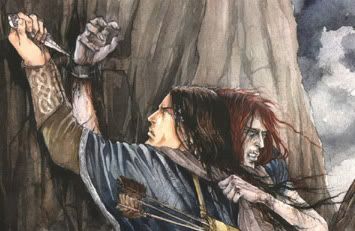Tolkien, in Letter 246, p. 330 wrote:For me perhaps the most tragic moment in the Tale comes in II. 325 ff. when Sam fails to note the complete change in Gollum's tone and aspect. 'Nothing, nothing.', said Gollum softly. 'Nice master!'. His repentance is blighted and all Frodo's pity is (in a sense*) wasted.
*In the sense that 'pity' to be a true virtue must be directed to the good of its object. It is empty if it is exercised only to keep oneself 'clean', free from hate or the actual doing of injustice, though this is also a good motive.

(I know it is in my sig pic, but I put here for posterity's sake.
I agree with Tolkien that this is the most tragic moment of the LOTR (that's charitable of me, isn't it?
It was this flaw in his character that caused Sam’s failure. But – many of you are quick to enjoin – Sam’s character was given to him by Eru. Thus, like Fëanor’s more spectacular failure before him, Sam’s failure was not a result of free will at all, but simply part of Eru’s plan. And Tolkien himself suggests this, in an off-hand way. In the same letter (back to p. 330), he says “That is due of course to the ‘logic of the story’. Sam could hardly have acted differently.” He certainly seems to be implying here that Sam had no choice but to act in the way that he did in order for the “story” to proceed.Sam was cocksure, and deep down a little conceited; but his conceit had been transformed by his devotion to Frodo. He did not think of himself as heroic or even brave, or in any way admirable – except in his service to his master. That had an ingredient (probably inevitable) of pride and possessiveness: it is difficult to exclude it from the devotion of those who perform such service. In any case it prevented him from fully understanding the master that he loved, and from following him in his gradual education to the nobility of service to the unlovable and of perception of damaged good in the corrupt.
However, as there are always are, there are layers within layers. Gandalf (who must be considered at least to some extent as a “heavenly messenger”) tells Frodo (and us) in A Shadow of the Past that there is a chance of Gollum being “cured”. That suggests that one possible “reality” involved Gollum finding redemption. Tolkien even kindly shows us that alternate reality. Right after telling us that Sam could hardly have acted any differently, he describes what would have happened if Sam had acted differently:
My friends, think about this. Tolkien says that the ending would have been different, and that is true to some extent, but the ultimately sought goal – the destruction of the Ring – would have been achieved. Indeed, it would have been achieved in a much “cleaner” fashion. Frodo need never have suffered the guilt of his own perceived failure, because he would have been saved from that last ultimate test. Gollum himself would have achieved at least a partial redemption. And there would have been no need for Eru to actively insert His finger into the story to tip Gollum into Mt. Doom, because Gollum would have found the means to freely choose to go into the fire. But for the servile arrogance of Samwise Gamgee.If he had, what could then have happened? The course of the entry into Mordor and the struggle to reach Mount Doom would have been different, and so would the ending. The interest would have shifted to Gollum, I think, and the battle that would have gone on between his repentance and his new love on one side and the Ring. Though the love would have been strengthened daily it could not have wrested the mastery from the Ring. I think that in some queer twisted and pitiable way Gollum would have tried (not maybe with conscious design) to satisfy both. Certainly at some point not long before the end he would have stolen the Ring or taken it by violence (as he does in the actual Tale). But ‘possession’ satisfied, I think he would then have sacrificed himself for Frodo’s sake and have voluntarily cast himself into the fiery abyss.
But I see that I still have not answered my own question. Was Samwise’s failure one of free will, or one pre-determined by Eru? Was he doomed by his own nature – as given to him by Eru – to fail at that moment, or could he have transcended his own flaw at that critical moment? I keep going back to Gandalf’s words to Frodo: I have not much hope of Gollum being cured before he died, but there is a chance of it. As it turns out, that chance depended upon Sam’s ability to leap beyond his own flaw at that critical moment. There might not have been much of a hope of him doing so, but there was not ‘no hope’. Thus his failure must have been one of free will. Otherwise, Eru really is nothing more then a storyteller, deciding what will happened based on nothing more then "the logic of the story."



